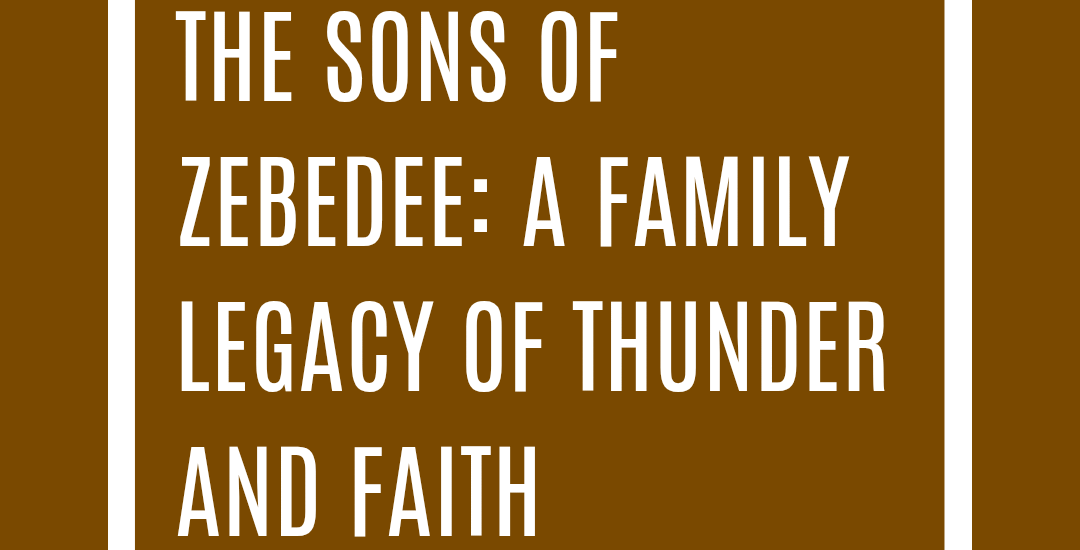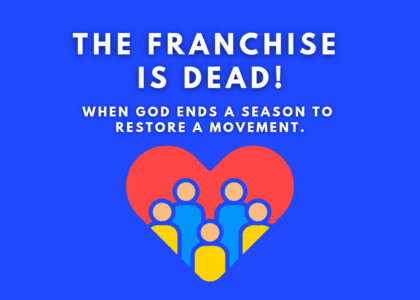Called From the Boats
The sun glistened on the waters of Galilee as James and John worked alongside their father Zebedee. Fishing was more than a job; it was the lifeblood of families in first-century Palestine. Zebedee was no small fisherman. Mark 1:20 notes that he had hired servants, which means his household business was relatively prosperous. He had built stability for his family, provided boats, and raised sons who knew the discipline of hard labor.
Yet, into this routine came disruption. Jesus of Nazareth called James and John to leave their nets: “Follow Me, and I will make you fishers of men” (Matthew 4:21–22).
Immediately, they left their father, the boat, and the business to follow Him. Zebedee is left unnamed in that moment—sitting in the boat, watching his sons walk away. His silence is thunder in itself. He let them go. His release became the doorway to their destiny.
The Hebrew root ’azav (עָזַב), “to leave or forsake,” describes not just physical departure but a reorientation of loyalty. Zebedee allowed his sons to ’azav the familiar so they could cling to the eternal. His willingness to be left behind marks him as more than a bystander; he became the silent partner in their discipleship.
Sons of Thunder
Jesus gave James and John the nickname Boanerges—“Sons of Thunder” (Mark 3:17). This was not a compliment or a rebuke, but a recognition of who they were. In Aramaic, bene regesh means “sons of commotion or tumult.” These were men of zeal, fire, and bold ambition.
Their thunder was heard in Luke 9:54, when they wanted to call down fire on a Samaritan village. It rumbled again in Mark 10:35–37, when they sought seats of honor beside Christ’s throne. They were passionate, perhaps even impetuous, but Jesus did not extinguish their fire. He redirected it. Passion under control becomes power.
The transformation of thunder into testimony is one of the great arcs of their story. But behind these fiery brothers stood parents who had shaped them in both strength and weakness. Zebedee gave them discipline and a stable livelihood. Salome gave them devotion and boldness. Together, their legacy explains much about why James and John thundered so loudly—and why Jesus chose to sanctify, not silence, their voices.
James: The First to Fall
James, the elder, walked closely with Jesus. He saw Jairus’ daughter raised, stood on the Mount of Transfiguration, and prayed in Gethsemane. His life, however, was cut short. In Acts 12:2, Herod Agrippa ordered his execution by the sword.
The Greek word martys (μάρτυς), meaning “witness,” later took on the meaning “one who dies for their faith.” James became the first apostolic martyr. His thunder ended in sacrifice, but his death became a witness louder than his words.
For Zebedee and Salome, the cost of discipleship was no longer theoretical. They had released their sons, and one was taken by the sword. Their silent faith was tested in blood. Yet their legacy endured, because faith that releases also accepts the cost.
John: From Thunder to Beloved
John lived a longer arc. Once ambitious and brash, he became the “disciple whom Jesus loved” (John 13:23). At the Cross, he received Christ’s charge to care for Mary, the mother of Jesus—a striking parallel to the parents who had once cared for him. His writings—the Gospel, the Epistles, and Revelation—carry the heartbeat of love, using the word agapē (ἀγάπη) more than any other New Testament writer.
Tradition says John lived into old age, serving as a father to the churches, particularly in Ephesus. His thunder became pastoral, prophetic, and enduring. The boy raised by Zebedee and Salome became the elder who shaped the church.
Salome: A Mother’s Boldness
If Zebedee’s legacy was silent release, Salome’s was outspoken devotion. In Matthew 20:21, she asked Jesus to grant her sons places of honor in His kingdom. Her boldness reflected motherly love and ambition, but it also revealed her faith: she believed Jesus truly had a kingdom.
Jesus redirected her request, teaching that greatness in His kingdom comes through servanthood. The Greek diakonos (διάκονος) means not just servant but one who ministers by lowering themselves. Salome had to learn, as all parents do, that love must sometimes release ambition so children can discover God’s greater purpose.
Salome’s devotion is also seen at the Cross. Mark 15:40 names her among the women who stood near as Jesus died. She witnessed suffering most disciples fled from. Her legacy, therefore, is one of presence—ambitious at times, but ultimately faithful.
The Legacy of Zebedee and Salome
Together, the parents of James and John left a profound legacy:
Zebedee’s Legacy: Release.
He let his sons go, trusting a higher call. His quiet surrender gave room for thunder to echo across the world.
Salome’s Legacy: Devotion.
She was bold, sometimes misdirected, but always present. From seeking thrones for her sons to standing by the Cross, her devotion endured.
Their sons reflected both parents: the strength of discipline, the boldness of devotion, the rawness of ambition, and the willingness to be reshaped by Christ.
Parents today can see themselves in this couple. Some are called to release children into paths they cannot control. Others are tempted to push ambition where God calls for humility. Both legacies matter. The Kingdom advances when fathers and mothers let go, even with trembling hearts, so sons and daughters can hear the voice of Christ for themselves.
Thunder That Still Echoes
The Sons of Zebedee began as fiery fishermen. One gave his life in youthful zeal; the other matured into the voice of love. But their legacy was not just their own. Zebedee’s quiet release and Salome’s bold devotion shaped them as surely as Jesus’ call did.
From this one family came waves that reached the world: martyrdom that emboldened the church, writings that defined Christian theology, and a testimony that thundered through time.
Theirs is not just a story of two brothers but of a family whose faith—silent, bold, flawed, and faithful—became part of God’s redemptive plan. When we hear “Sons of Zebedee,” we should also remember the father in the boat and the mother at the Cross. Together, they remind us that discipleship is not just personal—it is generational.
The thunder of James and John still echoes today. But if we listen closely, we may also hear the quieter legacy of Zebedee and Salome—the faith that releases, the devotion that stays, the love that believes, even when it costs everything.





